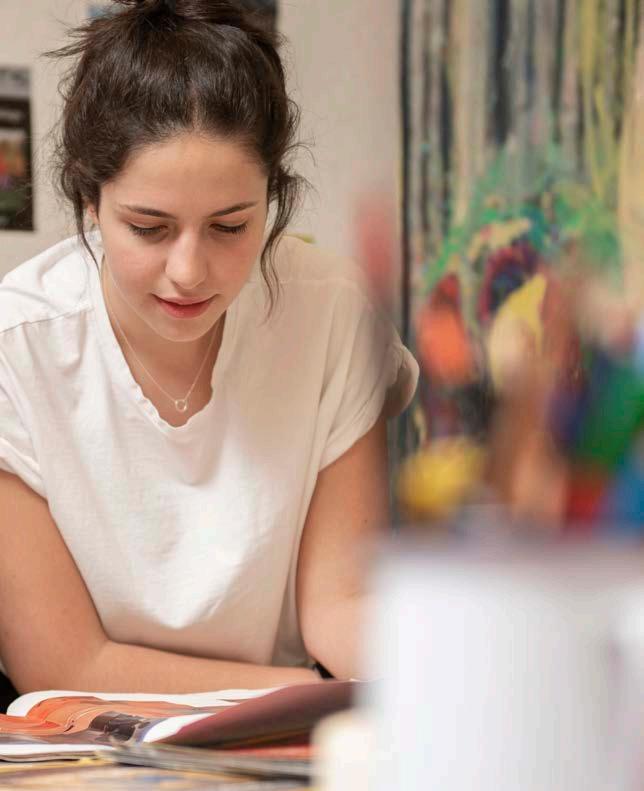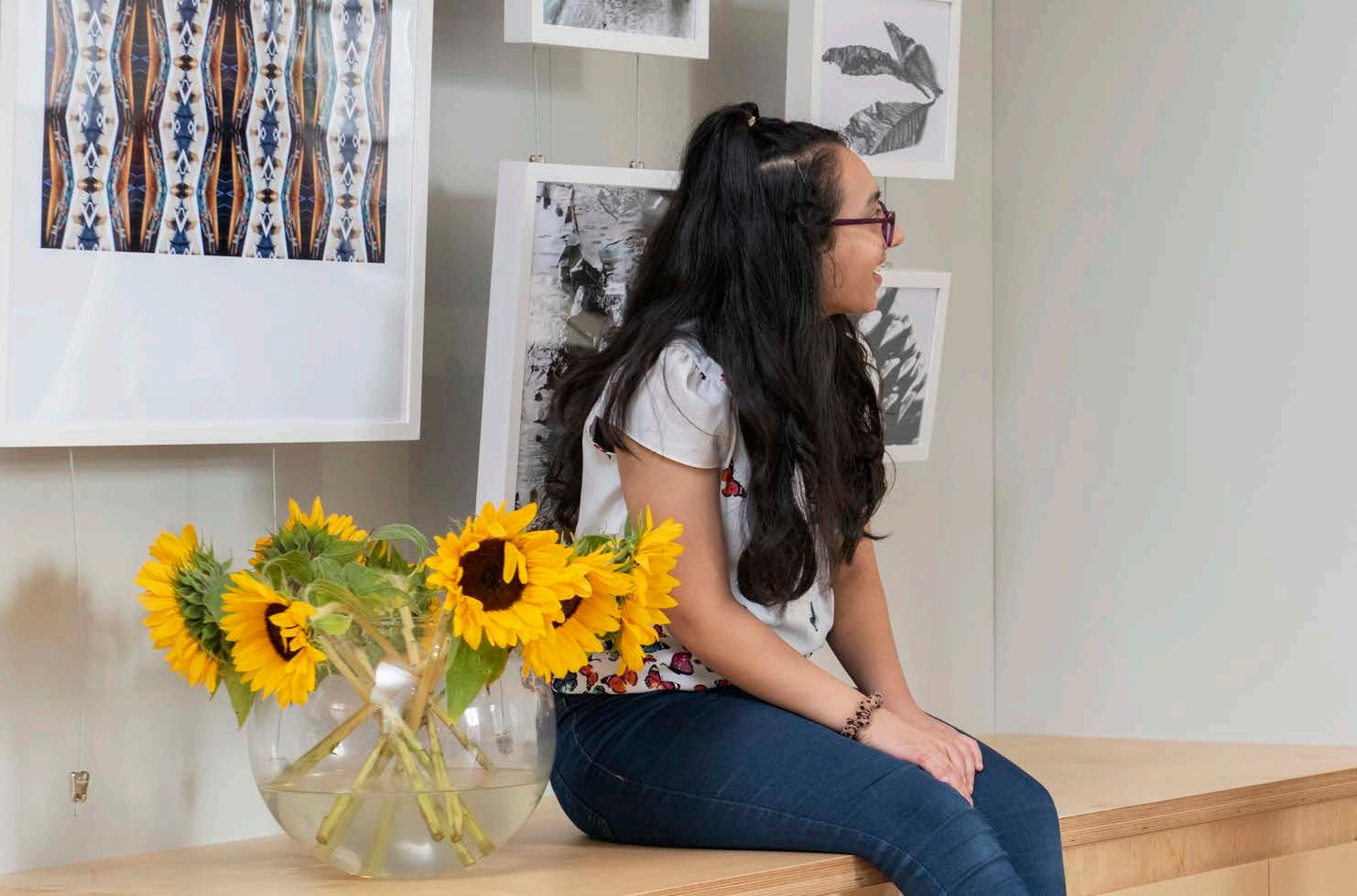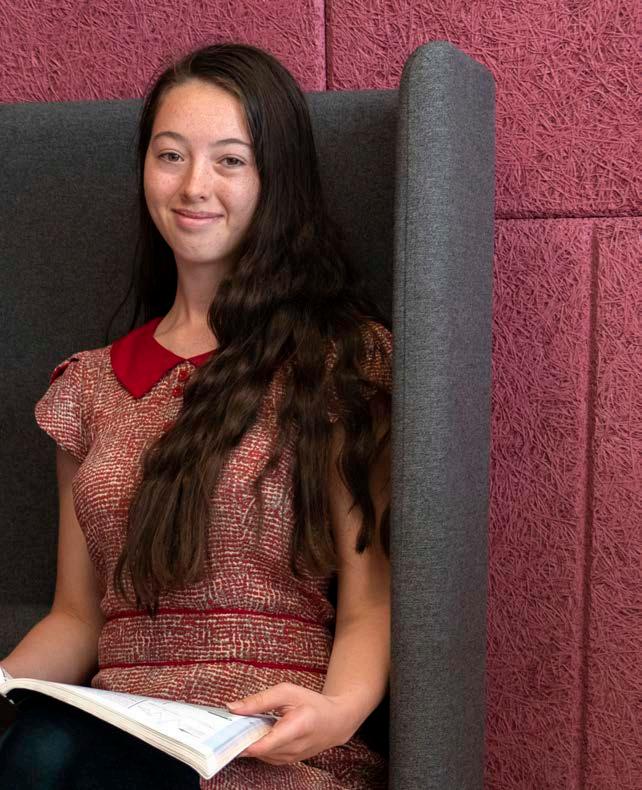
8 minute read
BOLD
Girls-only Sixth Form brightongirls.gdst.net/sixth-form/
Girls achieve more when they are given their own dedicated space in which to develop.
Advertisement
Self-confidence, resilience, academic attainment and enhanced career progression some of the benefits of a girls-only Sixth Form.
TIME FOR SOMETHING DIFFERENT…
Choose from a vast selection of clubs and co-curricular activities:
Try a new sport, from Boxing, Skateboarding, Watersports, Karate, and Gymnastics to a full range of team sports including Football, Netball, Hockey and Rugby where there’s plenty of support and camaraderie on offer.
Love music? You can join Brighton Girls Chamber Choir (with the option to join a tour to Italy) Orchestra, Rock and Pop School, Flute Ensemble or Violin Quartet. Or belt out a Pop song in Brighton Girls Voices club, or join Theatre club.
Coding and Maker Club is perfect if you’re interested in the GDST Space Technology Diploma, or simply want to design your own game.
Get creative at our design and art clubs, or if words are your medium, join the Creative Writing club or pursue your interest in journalism with the Temple Times Newspaper club. Learn a language or discover other cultures at our various language and culture clubs.
Weekly sessions are also on offer for scientists to help boost your grades, and a Bridge to University group for all students going to university.
“THE STAFF ARE ALL REALLY NICE, THE CLASS SIZES ARE SMALL, THE SUPPORT WHEN APPLYING TO UNIVERSITY IS VERY GOOD AND THE SCHOOL AND SIXTH FORM ARE VERY FRIENDLY – IT’S A REAL COMMUNITY.”
STUDENT, YEAR 12 brightongirls.gdst.net/sixth-form/

Supporting You
At Brighton Girls, we understand that some students may need a little more time and support to achieve their academic potential.

At the core of what we offer is increasing your confidence and self-belief so you feel equipped to meet the demands not just of the Sixth Form day, but also life beyond the classroom. Treating each student as an individual is important to us, and we work alongside your teachers and parents to ensure our approach is student-centric.
We monitor students closely, and any concerns raised by a department are followed up quickly and efficiently. The small sixth form classes means that the teachers can get to know the students well and tailor their teaching to the needs of the group.
Meet our wellbeing dog!
Through the GDST family, we can connect you to 70,000 professional women potentially offering help, advice and work experience placements. You can connect with alumnae via the GDST Rungway app which is great for asking questions and making useful connections with those already at university or in the working world. Sixth Formers can benefit from help with sourcing work experience with alumnae and opportunities to apply for paid inter nships via the Network.
brightongirls.gdst.net/sixth-form/
UNIQUE OPPORTUNITIES & COMMUNITY
You will have access to a vast range of leadership roles and inspirational speakers, and develop links with the local community. All helping you to live your best life at Sixth Form and preparing you for the world beyond.
Sixth Formers lead the way in developing links with the local community, working with representatives across the School to run charitable events and raise funds and awareness for various causes. Recent examples included City Mission and volunteering with the local foodbank. Events have included the Brighton Marathon where we manage a water station, a Christmas Tea Party for local Senior Citizens, involvement in the St Anne’s Well Garden Festival, choir singing in Churchill Square and collecting donations for Brighton homeless at Christmas time.


Art & Design / Biology / Chemistry / Classical Civilisation / Computer Science / Dance / Design & Technology / Drama & Theatre Studies / Economics / English Language / English
Literature / Food Science and Nutrition / French / Geography / Government & Politics / History / Latin / Law / Mathematics / Further Mathematics / Music / Philosophy, Religion & Ethics / Photography / Physics / Physical Education (PE) / Psychology / Sociology / Spanish
Art & Design /
The opportunity to build on the solid foundation of GCSE Art is one that many students take. The A Level course is a natural follow on encouraging observational skills, experimentation with materials and imagination, analysis of the visual world and discovering ways to reflect and interpret ideas. Through exploration of practical techniques such as printing, mixed-media, painting and three-dimensional materials, students can develop their confidence and understanding of all things visual. Drawing, as in the GCSE, is the backbone of the course and pupils learn to use it as the means to begin their personalised research.
All Sixth Formers have access to a dedicated specialist workspace in the Sixth Form studio so that they can be supported in working outside of lesson time. Practical exploration of art history and contemporary artists through studies and sketchbook work are begun from a wide range of visits to exhibitions and galleries. Students are encouraged to explore their ideas in depth and through their practical skills, develop independent research. Themes of study are wide ranging but often include aspects of the natural world, artist and architects, the human form, and the built environment. The school’s unique location in the centre of Brighton allows students to study the urban and natural environment. This makes for exciting outcomes and many of our students are inspired to study Art at degree level.
Course structure /
Exam board: OCR
Unit 1: Personal Investigation (60%)
This unit is divided into the practical and academic section. Emphasis is on practical coursework developing ideas, refining them in sketchbooks as well as some final resolved pieces. Academic research allows students to study in depth aspects of the visual arts that particularly interest them. This personal study will take the form of a visual workbook with an accompanying 3000-word essay.
Unit 2: Controlled Assignment (40%)
From a series of thematic titles given by OCR, the candidate chooses one question which needs to be researched by direct observation and artists research. Over a preparatory period of 8 weeks, students develop ideas in a supporting sketchbook and prep. Sheets to present alongside their final piece. (15 hour examination)
Beyond A Level /
Students will develop sufficient skill for the study of Art to be rewarding in its own right, but it also provides an essential foundation for a wide range of careers in Art, Design and Architecture. Art is accepted for entry into Arts and Humanities courses at universities and as a supporting A Level in many other subject areas.
Careers include: theatre design, fashion design, graphics, architecture, computer game design, art historian, museum and gallery work, film and television to name but a few!
Entry requirements /
GCSE Art (Grade 6)
Alternatively, an art portfolio submission will be considered where students have not studied Art at GCSE
Biology /
If you are interested in how complex organisms are arranged in order to fulfil their function, then this is the subject for you. Biology is never far from the news, and with scientists still trying to understand the long impacts of COVID, this is truer than ever. You may have recently seen that technology is now improving at such a pace that, a possible way to upgrade current artificial intelligence is to use human brain cells. Boys are now being advised to have the HPV vaccine in order to prevent certain cancers, and RNA is again in the news but this time advancing regenerative personalise medicine, gene therapy and biotechnology. All of this, and more, can be linked to the A-Level Biology course. You will cover topics involving microorganisms up to large populations. You will study and understand how the organelles of cells work, and learn about how DNA technology could help prevent diseases spreading or stop tumours growing.
The course also covers the current issues of how climate change is affecting our environment and what this may mean in the future. This range of topics ensures there is something that every student knows they will love, and many other topics they will realise they find fascinating. Biology A Level is challenging but also rewarding and you will be amazed at the progress you will make across the two-year course.
Course structure /
Exam board: AQA
It is a linear two-year course and comprises of three exams at the end. The first is based on the year 12 content and finishes with three 5-mark questions. The second is based on year 13 content and finished with a 15-mark comprehension. The third exam is a synoptic paper that covers both years and finishes with a 25-mark essay (which you will be fully prepared for – these are nothing like English or history essays). You will also be required to complete 12 required practicals. You will be given a lab book to use and complete throughout the course. After each practical your lab book will be marked and skills ticked off. At the end of the course, if you pass your practical skills you will be awarded a P after your grade. E.g. A P.
Beyond A Level /
An A Level in Biology will show any university or future employer that you have a good set of transferable skills including statistical, evaluative, comprehensive, practical and teamwork skills. These are desirable even if you do not choose to go on and study Biology at a higher level. Biology is an essential component for any degree involving the biological sciences. Chemistry would also have to be taken if a medical or healthcare related degree was being considered. There have been students who take Biology with the intention of not studying this at a higher level, who have gone on to study a range of subject from Law, English, History, Maths, and Physiotherapy degrees.
Entry requirements /
GCSE Mathematics (Grade 7)
GCSE Biology or Double Science (Grade 7)
Chemistry /
Chemistry A Level delves more deeply into topics with which you are already familiar, such as bonding, and those with which you may not be, such as entropy. Chemistry requires an understanding and application of knowledge, making it completely different to the demands of GCSE. As an experimental science lessons in our Sixth Form will reinforce what you learn; we do far more experimental work than the core/required practical work required by the course. You will benefit hugely from working in smaller teaching groups because it allows dedicated one-to-one support; you will not simply be ‘a face in the crowd’ struggling to get help.
A weekly, exclusively A Level, clinic is a central part of our teaching and learning in addition to being able to come and see your teachers at any time for additional help. You will develop excellent learning independence, an essential skill for university and beyond, whilst still enjoying and benefiting from the structure and support we provide.
Course structure / Exam board: Edexcel
There are three examination papers that are taken at the end of the course and no assessed coursework. There are 16 core (required) experiments that are compulsory (although, of course, we do more than that).
There are three examination papers, taken at the end of the course:
Unit 1: Physical chemistry and inorganic chemistry (30%) (1 hour 45 minutes)
Unit 2: Organic chemistry and physical chemistry (30%) (1 hour 45 minutes)
Unit 3: The entire course, including the practical skills gained from the core (required) practical exercises (40%) (2 hours 30 minutes)
Beyond A Level /
Chemistry is essential for a wide variety of careers, such as medicine, pharmacy, dentistry, veterinary science and biochemistry. You could even become a chemistry teacher. Given the problem solving, analytical and research skills that the course will help you to develop, along with teamwork and communication, it provides an excellent route into non-scientific subjects, such as law and journalism.
Entry requirements /
GCSE Mathematics (Grade 7)
GCSE Chemistry or Double Science (Grade 7)


